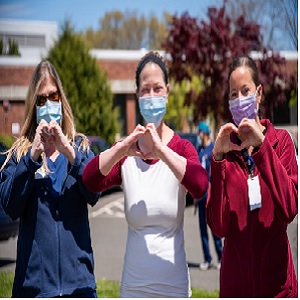The State of New Jersey's Health Workforce in 2022
 The healthcare industry is changing and there is a nationwide shortage of nurses, doctors, and other people in the medical field. In recent years, there has been an influx of older nurses and doctors retiring at the same time as new patients are entering the system.
The healthcare industry is changing and there is a nationwide shortage of nurses, doctors, and other people in the medical field. In recent years, there has been an influx of older nurses and doctors retiring at the same time as new patients are entering the system.
On top of the ordinary generational transition, the COVID-19 pandemic has also caused a significant shortage of caregivers. Whether due to healthcare worker burnout or vaccine hesitation amongst healthcare workers themselves, the state of New Jersey is currently experiencing a serious shortage of healthcare workers that exacerbates the pandemic chaos.
In this article, we'll take a look at the state of New Jersey's healthcare workforce, its current and future needs, and what state politicians are doing to address this need.
How is New Jersey addressing the healthcare worker shortage?
It’s estimated that two out of every five active physicians nationwide will be at retirement age within the next 10 years, and this will impact New Jersey fairly hard, as the state produces the fewest new practicing physicians. This has been going on for several years, with many NJ counties being described as “health care deserts" in 2019, before the pandemic.
Several measures have been drawn up and proposed by various politicians and healthcare boards to address the issue. These include:
- Helping low-income medical students attend training.
- Allowing medical students to complete training in three years (instead of four).
- Opening more medical schools statewide.
- Hiring foreign healthcare workers to immigrate and work in the US.
The younger generation is being encouraged to pursue medical training programs, such as those offered by Prism Career Institute in NJ, with costs being offset by government subsidies.
While all of these measures will have long-term benefits on New Jersey's healthcare workforce, they don't address the immediate needs of hospitals during the pandemic.
Hospitals are desperate for workers despite contagion risks.
A recent Politico article highlighted the story of a New Jersey nurse who was instructed to come in for work, despite testing positive for COVID-19. Similar stories have cropped up around the nation, and asking healthcare workers to come in for duty while sick themselves shows just how desperate hospitals are for employees.
The most recent CDC guidance allows for this practice, saying that asymptomatic healthcare personnel should not receive work exemptions, as long as their vaccines and boosters are fully up to date.
The largest health care union in New Jersey, the HPAE (Health Professionals and Allied Employees) is against the CDC guidelines, with spokespeople and union workers saying they feel abandoned by New Jersey's mandates, and various conflicting CDC guidelines.
As mentioned above, hospitals are also desperately trying to hire more immigrant healthcare workers, or offering sponsorships to study medical training in the US. However, this has an adverse effect on poorer countries who are also dealing with the pandemic and healthcare worker shortages.
Vaccine hesitancy still exists in a small population of healthcare workers.
While union employees are concerned about the risks of contagion on-site, due to CDC guidelines mentioned earlier, other healthcare workers are quitting or losing their jobs because of (non-compliance with) vaccine mandates.
It seems that vaccine hesitancy or anti-vaccination sentiments, despite being portrayed as a political stance primarily of the American right-wing, is actually a sentiment felt across a wider spectrum of the American population.
“Antivax” became a mainstream word mainly used against right-wing politicians and pundits, but anti-vaccination sentiments have long had roots in organic wellness and homeotherapy movements on the left as well.
Some hospitals across the nation have reportedly fired or lost hundreds of employees due to those employees' unwillingness to cooperate with federal or state vaccine mandates.
While this article reports that around 96% of New Jersey's total healthcare workforce are following the vaccination mandates, even a reduction in a few hundred employees during this pandemic causes chaos and major disruption in the healthcare system.

